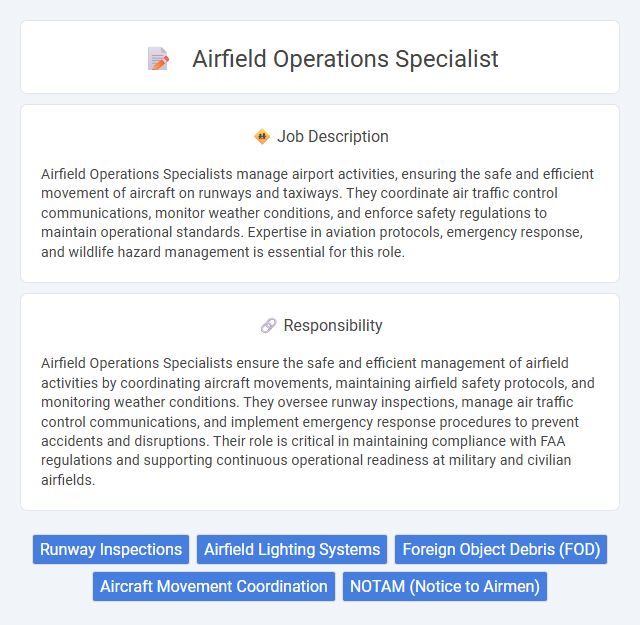
Airfield Operations Specialists manage airport activities, ensuring the safe and efficient movement of aircraft on runways and taxiways. They coordinate air traffic control communications, monitor weather conditions, and enforce safety regulations to maintain operational standards. Expertise in aviation protocols, emergency response, and wildlife hazard management is essential for this role.
Individuals with strong attention to detail and the ability to remain calm under pressure are likely well-suited for the role of an Airfield Operations Specialist. Candidates who can handle fast-paced environments and possess excellent communication skills probably find this position fitting. Those who struggle with multitasking or adapting to changing conditions may face challenges in performing effectively.
Qualification
Airfield Operations Specialists must possess a high school diploma or GED, with many employers preferring candidates who have additional military experience or formal training in airfield management and aviation safety. Proficiency in air traffic control procedures, emergency response, and the use of specialized communication systems is essential for effective performance. Certifications such as FAA Airfield Driving Certification and knowledge of National Incident Management System (NIMS) protocols enhance qualification credentials.
Responsibility
Airfield Operations Specialists ensure the safe and efficient management of airfield activities by coordinating aircraft movements, maintaining airfield safety protocols, and monitoring weather conditions. They oversee runway inspections, manage air traffic control communications, and implement emergency response procedures to prevent accidents and disruptions. Their role is critical in maintaining compliance with FAA regulations and supporting continuous operational readiness at military and civilian airfields.
Benefit
Airfield Operations Specialist roles likely offer benefits such as access to specialized training and skill development in aviation safety and coordination. Employees might experience stable job prospects due to the essential nature of airfield management in both military and civilian sectors. There is probably potential for career advancement through increased responsibilities and certifications related to airfield operations.
Challenge
Airfield Operations Specialists likely face the challenge of managing complex daily activities to ensure safe and efficient airfield movement. The role may require quick decision-making under pressure, especially during emergencies or unexpected weather conditions. There is a strong probability that maintaining compliance with strict regulations and coordinating multiple teams simultaneously contributes to the job's demanding nature.
Career Advancement
Airfield Operations Specialists manage runway safety, air traffic coordination, and emergency response, providing critical support for efficient airport function. Gaining certifications such as FAA Airfield Operations or Safety Management System training enhances career progression opportunities in federal agencies or commercial airport operations. Experience in this role opens pathways to leadership positions, including air traffic management and airport operations supervision.
Key Terms
Runway Inspections
Airfield Operations Specialists conduct thorough runway inspections to ensure safety and operational efficiency by identifying surface hazards such as debris, cracks, and wildlife activity. They use specialized equipment to monitor runway conditions and coordinate with maintenance crews to promptly address any issues. Accurate and timely inspections are critical for preventing aircraft accidents and maintaining compliance with Federal Aviation Administration (FAA) regulations.
Airfield Lighting Systems
Airfield Operations Specialists manage and maintain critical airfield lighting systems, including runway edge lights, approach lighting, and taxiway lights, to ensure safe aircraft movement during low visibility conditions. They conduct regular inspections, troubleshoot electrical and mechanical issues, and coordinate with air traffic control to maintain optimal lighting functionality. Expertise in maintenance of airfield lighting control systems and compliance with FAA regulations is essential for operational safety and efficiency.
Foreign Object Debris (FOD)
Airfield Operations Specialists are responsible for identifying and removing Foreign Object Debris (FOD) to ensure runway safety and prevent aircraft damage. Regular FOD inspections and clean-ups reduce the risk of accidents and maintain operational efficiency at airports and military airfields. Expertise in FOD detection technology and rigorous adherence to safety protocols are critical for effective airfield maintenance.
Aircraft Movement Coordination
Airfield Operations Specialists play a critical role in aircraft movement coordination by managing the safe and efficient flow of aircraft on runways, taxiways, and aprons. They utilize radar systems, communication equipment, and real-time traffic data to direct aircraft movements, ensuring compliance with FAA regulations and minimizing delays. Their expertise in coordinating ground support services enhances operational efficiency and safety during aircraft arrivals, departures, and ground handling.
NOTAM (Notice to Airmen)
Airfield Operations Specialists play a critical role in managing NOTAMs (Notice to Airmen), ensuring timely dissemination of essential information about runway conditions, airspace restrictions, and temporary hazards to pilots and air traffic controllers. They coordinate with FAA and local authorities to verify the accuracy of NOTAMs, enhancing flight safety and operational efficiency on the airfield. Effective monitoring and communication of NOTAMs help prevent accidents and maintain compliance with aviation regulations.
 kuljobs.com
kuljobs.com